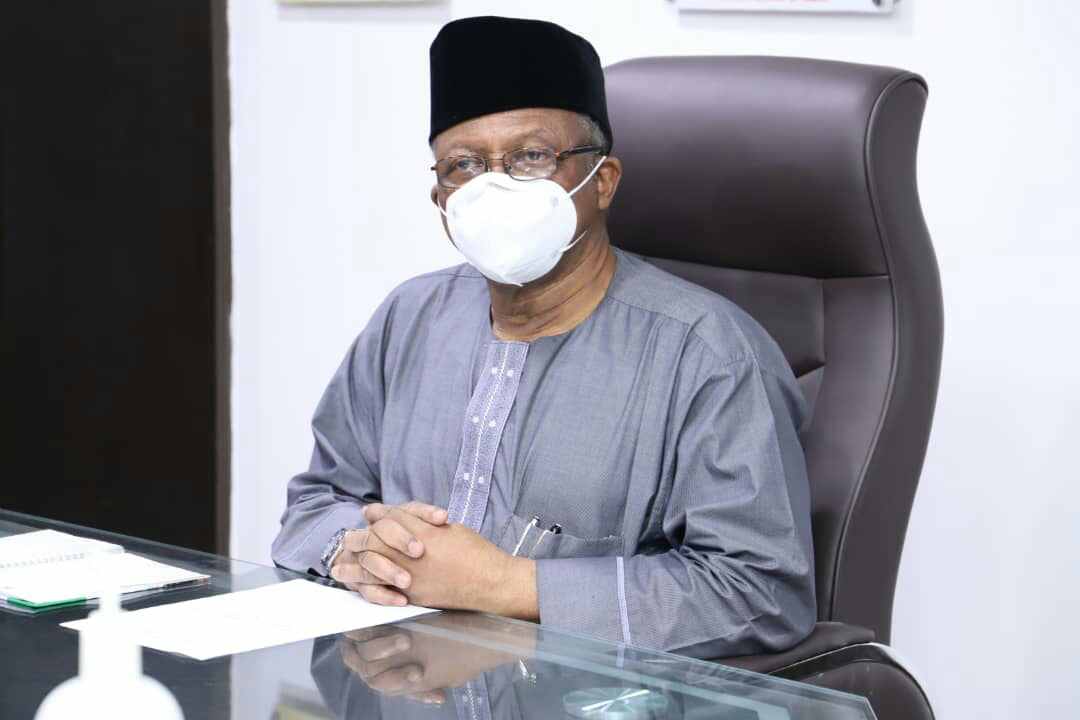TOYIN ADEBAYO, ABUJA
The Minister of Health, Dr Osagie Ehanire said there is good reason to prepare for Covid-19 invasion of rural areas with testing, first aid, ambulance service and commensurate Isolation and treatment centers.
This is as we expand and include small towns and rural areas in our testing scope, a more accurate picture of our Covid-19 status will emerge.
Ehanire made this known in Monday at the Presidential Task Force briefing in Covid-19, saying, the apparently fewer covid positive cases of the past few days give us no reason to rejoice or to lower our guard.
According to him; “However, we note with concern, the development in many overseas countries, of sharp upsurge in covid-19 cases, after they lifted or relaxed restrictions in air travel, commerce and especially in social activities. We know that some countries had to quickly restore lockdown or limit movement of citizens and even to postpone elections, in order to deal with the COVID-19 spike. In one country thousands of members of congregation of a religious group had to be put in quarantine, having tested positive.
“These are significant lessons for us, as we prepare to reopen our economy and as we consider options for resuming flights and travel operations, or opening schools and land borders. Unless we utilize lessons learned to define and set measured precautionary steps to mitigate the risks, the danger of falling into the same negative balance in our own COVID-19 strategy and losing the gains made so far, is real. The impact of lockdown on livelihoods and socio-economic activities is well known and serious and what we wish to avoid. The other side of this coin is the question of what we need to do to take up the challenge of keeping control of covid-19, as we reopen. This is a shared responsibility of government and people and an assignment for the entire country. It has been repeatedly stressed that the easiest, cheapest, well proven options are still the simple nonpharmaceutical interventions, like wearing masks, avoiding crowds and frequently washing hands. It is the least citizens can contribute, by adhering to these, and urging their neighbors to adhere, so that we together stand a better chance of limiting the negative consequences on the economy of easing and opening the borders.”, he explained.
He added that, “As of 17th August, 2020, Nigeria has recorded 49,068 covid-19 cases from 352,625 samples tested so far, with 36,497 persons successfully treated and discharged. We have sadly had 975 fatalities and a case fatality rate still about 2%. We continue to strive to lower the case fatality rate to less than 1%, because we believe more lives can be saved from COVID29, with the knowledge and system strengthening we have achieved over the past 6 months, even though I hasten to add that we do not yet know enough about covid19. But what we are sure of so far, is that strong response to COVID-19 is a collaborative effort between citizenry and government for the benefit of all Nigerians. While government provides direction, guidance and resources, citizens are to take ownership of the response”.
He said that, the continuity of health routine services, capacity building of health workers and their protection are paramount, to the Federal Ministry of Health and it is therefore a good opportunity to now urge our health workers to continue to focus on their assignments, from traveler screening, surveillance, sample collection, laboratory analysis to hospital and other forms of care. It is critical to maintain strict Infection Prevention and Control measures at all times, help to educate citizenry, support uptake of testing and reporting early for treatment when the test is positive.
The Minister added that, the National Health System is responding well enough so far to the COVID-19 challenge. Collaboration with States and Local Governments remains a cornerstone of a successful strategy. The Federal government is doing the needful to support funding to States, from disbursements of BHCPF to funding from the REDISSE program and PTF and other sources under preparation.
Ehanire stated that, “I paid an inspection visit to the Emergency Operation Centre (EOC) of the National Centre for Disease Control for an assessment of our covid-19 response efforts in the pillars under its purview. I noted strategies to improve the call connect center, surveillance, case finding, sample collection and testing, and in particular, the issue of Turnaround Time for testing, were discussed. NCDC is also making efforts to ensure that all laboratories in our network have a turnaround time under 24 hours. Nigeria continues to monitor new diagnostic technology, including saliva-based covid19 test, that is under development.
“The Federal Ministry of Health is working with its Agencies and partnering with State governments to serve rural areas by maintaining routine service and taking COVID-19 response to LGAs with sample collection sites, Holding Rooms and Oxygen treatment centers. State Epidemiologists are requested to speed up processing of test results and facilitate treatment and Isolation of positives, to address gaps in the value chain.
“I also visited the Thisday Dome Treatment Centre where over 120 patients have received treatment. The centre is functioning smoothly and I have directed it be upgraded to a comprehensive level 3 centre with functional Intensive Care Unit and dialysis facilities”, he added.

